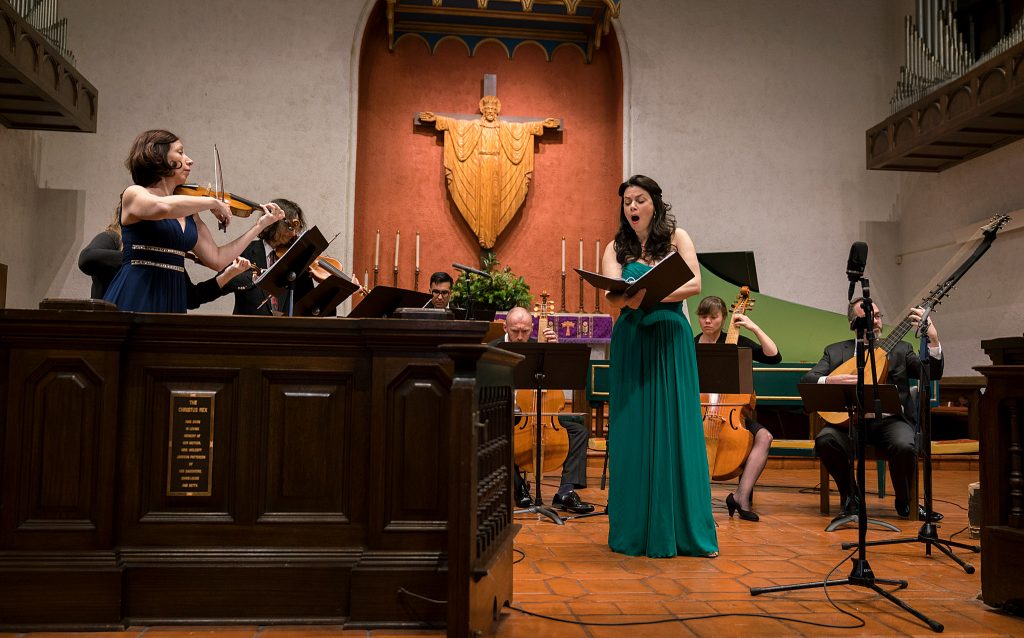Teutonic Treasure: Bach Collegium San Diego Plays the German Masters Before J. S. Bach
Doing its part to boost San Diego’s celebration of early music month, the Bach Collegium San Diego offered an array of obscure 17th-century German music—Agony and Ecstasy: Bach’s Muses—over the weekend, March 11 & 12, 2017. Soprano Nell Snaidas, the New York City based early music diva and frequent guest soloist with the Bach Collegium, sang several florid solo vocal cantatas as well as intimate lute songs, and Baroque violin virtuoso Julie Andrijeski complemented Snaidas’ vocal artistry with her bravura violin solos and obbligatos. The Bach Collegium lived up to its customary high standards of performance, balancing infectious verve with a considered appreciation of period performance practice.
Bach Collegium Artistic Director Ruben Valenzuela wisely opened his program with “O Fröliche Stunden,” a spirited solo cantata by Dietrich Buxtehude, an organist and composer from whom we are certain Sebastian Bach took direct influence. Any piano student who has learned so much as a Bach two-part invention has been told the saga of how the 20-year-old Bach asked the church fathers in Arnstadt for a four-week leave from his organist duties to hear the celebrated Buxtehude’s music in the wealthy Hanseatic city of Lübeck. Much to the consternation of his employers, Bach stayed in Lübeck for four months, taking in the city’s rich concert life that Buxtehude oversaw.Snaidas communicated the cantata text with ample exuberance—the opening line says it all “O joyful hours”—and the string ensemble of three violins and cello easily reflected her energetic, bright figurations, especially the frolicking alleluias that climaxed the piece. In accord with the duality of the program title, Snaidas sang Johann Nauwach’s song of quiet pathos “Jetzund kömpt die Nacht herbey” and Johann Philipp Krieger’s equally poignant lute song “An die Einsamkeit,” with lutenist Daniel Zuluaga providing deft, sympathetic accompaniment. Rapturous melodies in songs such as Heinrich Abert’s “Soll denn mein junges Leben” allowed the vocalist and instrumental soloist the chance to challenge each other in feats of florid ornamentation.
Choral directors and singers who only know the pious Lutheran choral music of Andreas Hammerschmidt no doubt chuckled at his humorous strophic song “Kunst des Kussens” (“The Art of Kissing”), a musical primer on an activity not usually associated with ecclesiastic devotion. And Adam Krieger’s “Der Rheinsche Wein,” struck me as an early commercial for the salubrious aspects of Rhein wine, a piece unlikely to be played for a 12-step social.
Among the instrumental offerings, a brisk, multipartite Canzona by Samuel Scheidt and a straightforward version of the now ubiquitous Johann Pachelbel Canon in D with its rarely heard Gigue displayed the Bach Collegium’s signature instrumental sonority, a bright edgy string sound built on a robust basso continuo foundation that included harpsichord, chamber organ, archlute and cello.
A sacred solo cantata attributed to the Bohemian-Austrian composer Franz Biber, “O dulcis Jesu,” gave Snaidas the opportunity to engage in tasteful ornamentation and delicate echo effects. Andrijeski bloomed in the instrumental interludes and was gifted with a fiery cadenza in the final ritornello that even Fritz Kreisler might have eagerly purloined and called his own.
Nearly every vocal piece revealed the bright shimmer of Snaidas’s uppermost range, which only grew in strength and luster as she ascended, but none was as compelling as the program’s sole opera aria, “Betrübter Geist” from Reinhard Keiser’s 1699 opera Hercules und Hebe.
Valenzuela and company closed the program with a tongue-in-cheek aria from Johann Sebastian Bach’s Coffee Cantata, BWV 211, in which Snaidas was able to declaim in mock protest that while she enjoyed her evening coffee, a randy husband would be a more appreciated nightcap.
Whether or not all of the composers featured on this ample program actually served as muse to the great Leipzig cantor is a topic on which musicologists could speculate at length. What is not up for debate, however, is the profound pleasure the Bach Collegium’s sophisticated and polished performance brought their audiences.
[themify_box style=”shadow” ]The Bach Collegium San Diego performed this program on March 11, 2017, at All Souls’ Episcopal Church in Point Loma and repeated the program on March 12, 2017, at St. James by-the-Sea Episcopal Church in La Jolla, the concert that was heard for this review.[/themify_box]

Ken Herman, a classically trained pianist and organist, has covered music for the San Diego Union, the Los Angeles Times’ San Diego Edition, and for sandiego.com. He has won numerous awards, including first place for Live Performance and Opera Reviews in the 2017, the 2018, and the 2019 Excellence in Journalism Awards competition held by the San Diego Press Club. A Chicago native, he came to San Diego to pursue a graduate degree and stayed.Read more…



